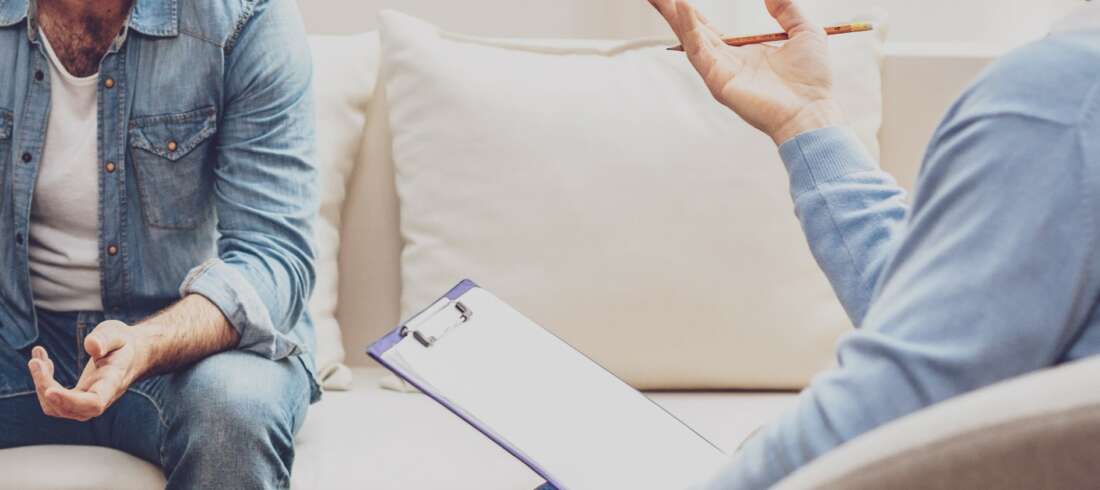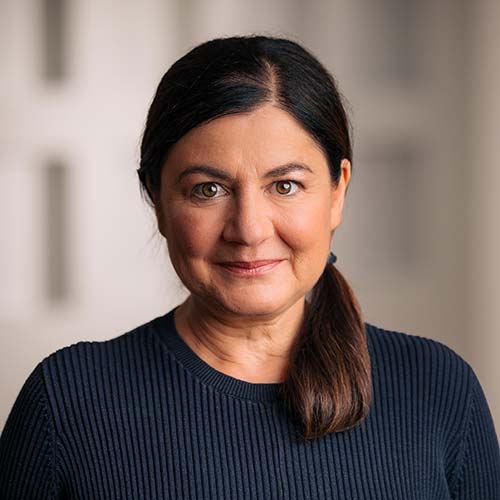Journalist Sebastian Scheffel from RedaktionsNetzwerk Deutschland turned the pages at the rheingold Institute - and was interviewed about his confidence. Here is his report on his experience:
"What do you think the world will look like in 30 years? What will your needs, wishes and hopes be then? And when you think of your own personal answer to this - how do you feel? Are you hopeful or pessimistic about the future? Perhaps you are also frightened by your inner answer to these questions about the future: Did I really just think that? Perhaps you are thinking a thought that has long been relegated to the deepest corners of your brain. And where it actually belongs: a dark place for dark thoughts.
I usually rarely experience moments like this. But on a Tuesday in May, I'm sitting at a large conference table and am immediately startled by my thoughts several times. Because the place at the table is actually more like a place on the couch, here I am facing a depth psychology interview. The rheingold Institute, which specializes in such interviews, wants to clarify the big questions in this way: How confident is Germany about the future? What gives people hope, what scares them?
There is no right and no wrong
Anna Brand, Director of Studies
With a light heartbeat, I step through the door of the institute, located in downtown Cologne. There, a friendly young woman welcomes me. Anna Brand is in charge of the project "The Confidence of Germans in Times of Multiple Crises." She and her colleagues are interviewing 35 people for two hours each, plus a large online survey. The study was commissioned by the nonprofit Identity Foundation.
"It's important for me that you really describe a lot from your everyday life. All the images, memories and situations that come to mind. And when you describe your life, it's also clear that there's no right or wrong," Brand introduces the conversation. That shouldn't be a problem, I think to myself; after all, as a journalist, I expect the same of my interviewees.
Alarm clock rings at an odd time, then first take a look at Twitter
Sebastian Scheffel
And indeed, I start by chatting away casually, and when asked I tell them about my interests (including cooking, eating and drinking well), my morning routine (alarm clock rings at an odd time, then first take a look at Twitter) and structure in everyday life (never leave the house without a shopping list). I also quickly come up with something when asked about my short-term goals - I'm already familiar with this from job interviews. I wonder what the stories from my everyday life are supposed to contribute to a study on Germans' fears and confidence.
When I read the published study later, I realize that this is precisely the point: "The impact of the crises is difficult for people to bear, which is why it doesn't come up in the conversations for a long time," it says. Instead, the interviewees would describe how well they were coping with their own lives. People try to suppress crises from their everyday lives.
Is it weird not to have a specific goal?
Sebastian Scheffel
After about 40 minutes, Brand asks the first question, which is explicitly aimed at the future. And it immediately unsettles me. "If you ever think about the distant future - 15, 20, 30 years from now - what will your plans be then and the issues that concern you?" I think about it, but there's no concrete thought I can hold on to.
Is it strange not to have a concrete goal? I feel caught, although my interviewer - as I said at the beginning - doesn't want to assess right or wrong. Until now, I sat leaning on the table facing her, but now I lean back with my arms folded. But the defensive posture does not prevent Brand from inquiring, apparently I have aroused her interest: "Where does that come from, that you don't have that, maybe asked in a funny way?"
"That's a good question. Especially because we've just talked about the fact that I'm planning a lot for the near future, but it's funny when it comes to the more distant future. I'm letting a lot come to me there," I answer. As I say this, the answer becomes clear to me: "Perhaps it has to do with the experience of the past few years, that an incredible amount is changing in the world. And that's why I don't know if it's worth planning what's going to be in 30 years, because in the end it's going to be different anyway."
Brand writes something down in her notepad. And I realize: I've never been so aware of this lack of vision. Is this a form of fear of the future? The study by the Rheingold Institute will later say: "Many people feel powerless. The feeling of being able to have an impact has been lost again for many."
The conversation now revolves around the major crises: the Corona crisis, which is over but may only have been a harbinger of further pandemics. About the war in Ukraine, which in the first few days triggered a hitherto completely unknown unpleasant feeling in me and gave me nightmares. And, of course, the climate crisis, which is even more threatening because it could threaten the very existence of humanity.
Brand asks me how I think society will change as a result. I suspect that things we take for granted will no longer be affordable, that we will perceive them as a luxury. "In addition, I think there will already be social upheavals when more people will flee due to the climate crisis and that will meet with resistance. That will perhaps create an atmosphere in which people will have even less understanding for fellow human beings."
As I speak, I ponder whether I'm talking myself into a dystopia, or whether I actually mean that
Sebastian Scheffel
As I speak, I ponder whether I'm talking myself into a dystopia or whether I actually mean it. Before I can come to a conclusion, I hear the next question: "What would be a worst-case scenario if this turns out to be the case?"
It is the second moment in the conversation when I am frightened of myself. I immediately have a scenario in my head. "Mmm, yes, you could say that in the worst case, perhaps...", I awkwardly try to delay the answer, "... that it would then come to civil war-like scenes, because we would only be fighting for survival." Because I realize that this must sound outrageous, I immediately put it into perspective: "Will this really happen and come to such a head? I don't know. It may not be unrealistic, but it also feels weird to say."
"The will to compromise is lacking, further increasing the sense of division. For many, more aggressiveness in togetherness becomes palpable"
Quote from the Confidence Study
I always had clear ideas about what could change in society in detail: Inflation, the rise of the AfD, a lack of resources. But I've never been able to think this through to the end and openly express where this could lead. After the interview is over, I ask Brand if my gloomy scenarios are an isolated case. She denies that this runs through all the conversations. "The will to compromise is lacking, further increasing the sense of division. For many, more aggressiveness in togetherness becomes palpable," she will write later in the study.
The confidence that is in the title of the study has hardly taken up any space in the conversation so far; it has been almost exclusively about the lack of confidence. Is that up to me? After more than an hour, Brand taps into the extent to which I find hope in various areas of life. Although the topic is now a less difficult one, I don't find it any easier to talk about. It's difficult to find anything that conveys great confidence. Brand now has to ask questions more often, and my answers are shorter.
Only after we have circled around various topics for a while can I identify two things that give me hope. One is the supposedly small things: for example, when I and other people decide to become vegetarians despite initial resistance, or to take the train rather than the car in order to fight the climate crisis. On the other hand, it's the very big perspective: "Humanity has already been through and survived so much, that gives a basic confidence that it will be the same in the future." I am also a typical case with these thoughts.
That is also my feeling: At this conference table, Germany and its fears for the future come to the couch
Sebastian Scheffel
The study describes this, on the one hand, as "indulgence trading": people try to implement small behavioral adjustments, for example, to do without their cars. The hope is that this will make people feel less guilty about the climate crisis. On the other hand, the study cites "hopes of redemption" as a source of confidence: Redemption can come from very different things, for example new technologies, God, the next generation or simply human reason.
When the conversation ends after exactly two hours, I feel exhausted. Brand explains that a lot comes up during such conversations. "There's such a thick curtain of repression that you first have to probe and dig deep with the interviewee." In this respect, the interview feels like a therapy session for some subjects. That's also my feeling: At this conference table, Germany and its fears for the future come to the couch.


